5 Strategies To Get More Benefits From Your Coffee
Coffee is the favorite beverage of millions of people in the world. The cultivation and trade of coffee and the enjoyment of a warm cup of coffee dates back to the 15th century when coffee was grown in the Yemeni district of Arabia. Throughout the 16th century, it made its way to Egypt, Turkey, Syria, and Persia, and to Europe in the 17th century.
Coffee was brought to the Americas, and soon coffee houses were popping up in the United States in the 18th century. Coffee clearly has a rich history and culture. As presented by the large variety of drinks – American, espresso, cappuccino, Turkish, Ethiopian coffee, and so on -, it is popular and loved around the world. But is it healthy?
The truth is that coffee has some astounding health benefits, but depending on what kind of coffee you are drinking and how much, it can have some drawbacks. If you are a coffee-lover and want to take full advantage of the benefits of this popular beverage safely, there are a few strategies you can try to improve your experience.
In this article, you will learn about the benefits of coffee. I will discuss what role polyphenols play in the benefits. You will understand the drawbacks of this popular drink. I will share my 5 strategies to get more benefits from your morning cup of Joe. I will also recommend my favorite organic coffee to support your health and optimize your morning.
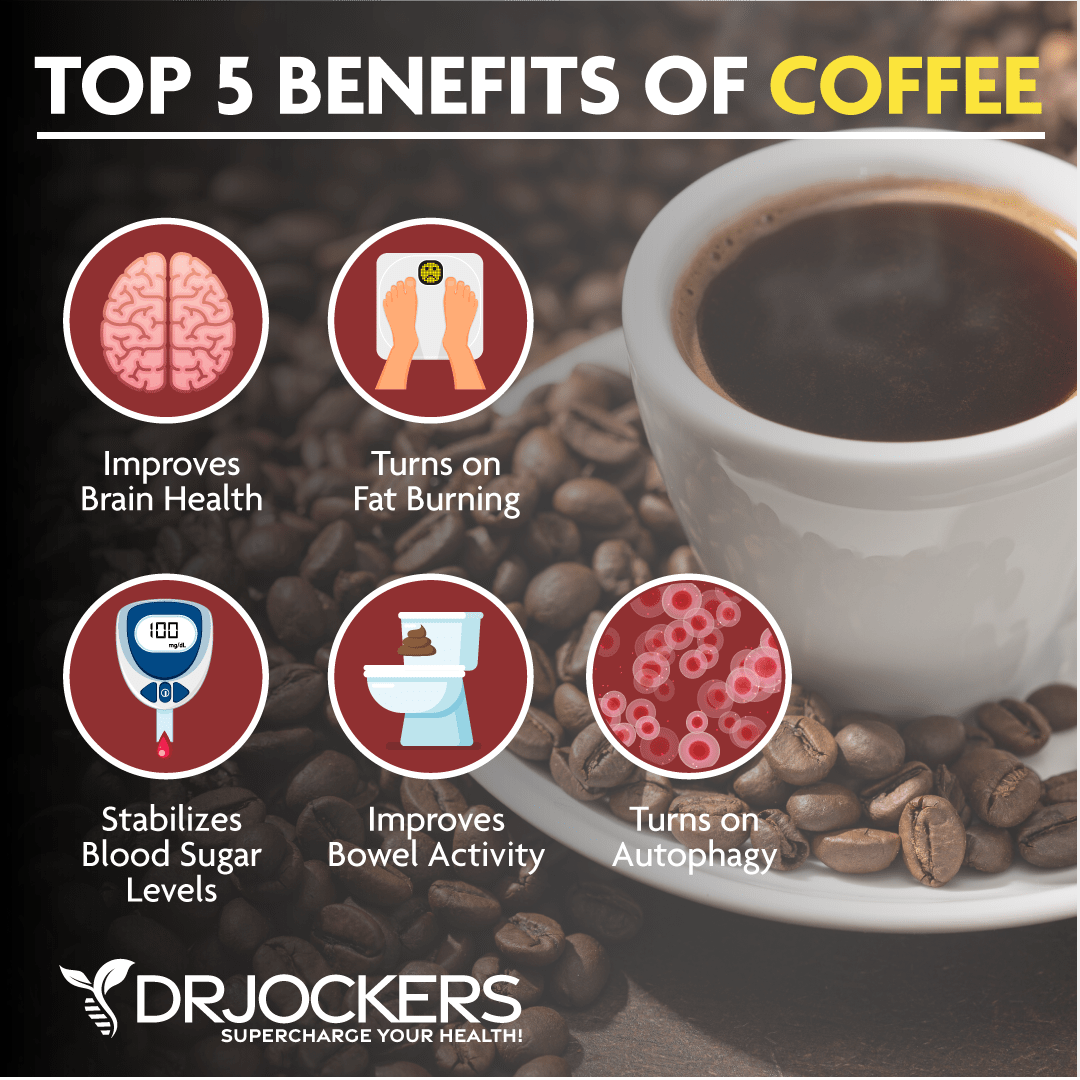
Benefits of Coffee
Coffee is not just a delicious morning drink, but it also offers some fantastic health benefits. I am not talking about the false sense of energy after a sleepless night, but true health benefits.
Brain Activity
The benefits of coffee for energy and brain performance have been well researched for decades. A 1993 study published in Neuropsychobiology and a 2000 study published in Psychopharmacology have both found that coffee can improve your alertness, energy, and performance levels during the day (1, 2). As a 1982 study published in Life Sciences explained, when you drink it, caffeine is absorbed into your bloodstream and then makes its way to your brain (3).
According to a 1996 study published in Pharmacology & Toxicology, caffeine blocks adenosine, an inhibitory neurotransmitter in your brain (4). This leads to an increase of dopamine and norepinephrine, which causes increased neuron activity in your brain.
Several studies, including a 2002 study published in Pharmacology and a 2008 review published in Nutrition Bulletin, have found that coffee can improve your brain function in a variety of ways, including boosting memory, energy, and mood (5, 6). Coffee may also be good for neurodegenerative conditions. According to a 2002 study published in the European Journal of Neurology, it may reduce the risk of Alzheimer’s disease (7).
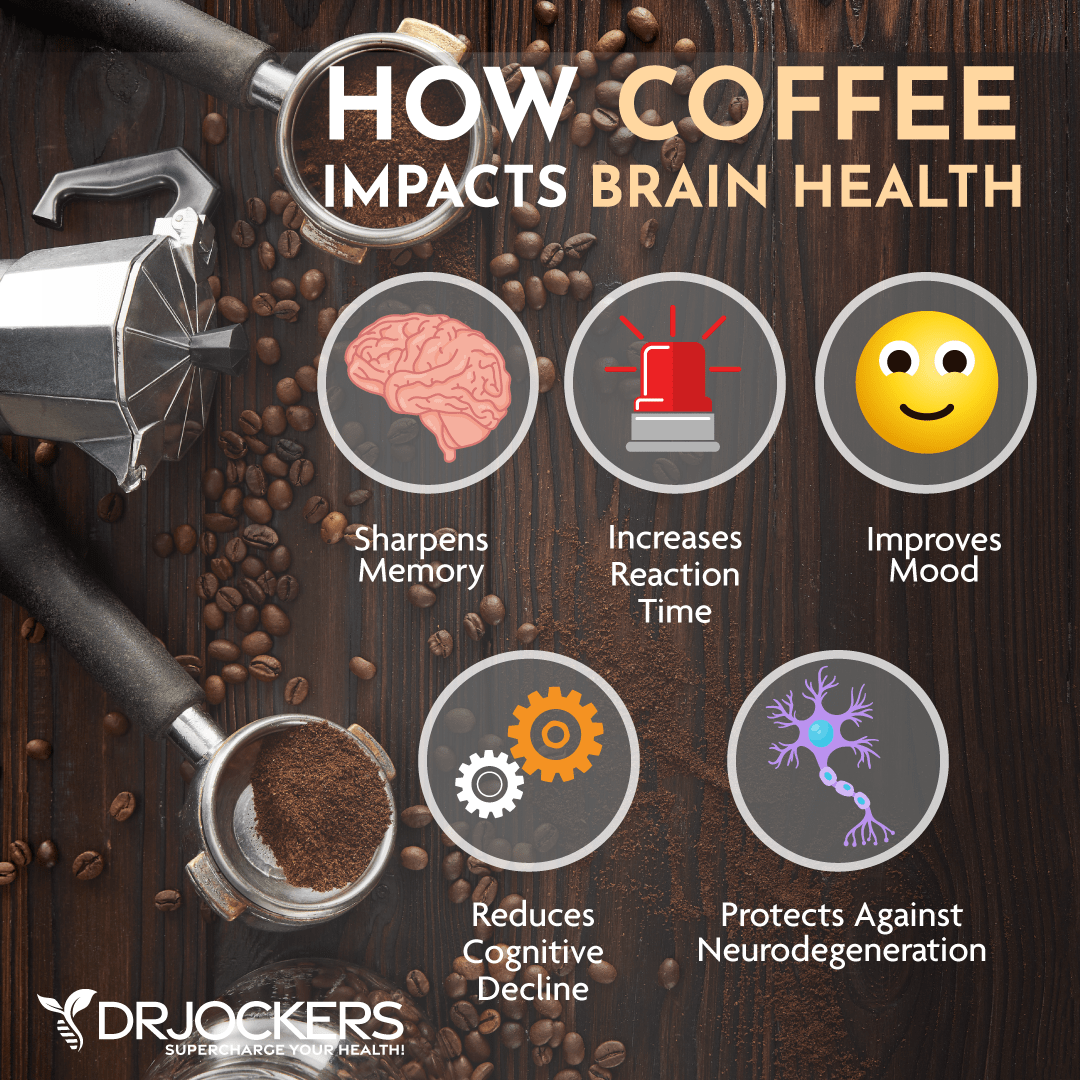
Fat Burning
If you want to lose weight, or more specifically, lose fat, coffee may be able to help you with that, too. Caffeine in coffee is a natural substance that can help your body burn fat more effectively.
According to a 1989 study published in the American Journal of Clinical Nutrition, coffee can influence thermogenesis and the daily expenditure of energy (8). The study has found that only 100 mg of caffeine has increased the metabolic rate of participants by 3 to 4 percent within 150 minutes and 8 to 11 percent after 12 hours of 2-hour caffeine intake intervals.
A 1995 study published in the Annals of Nutrition Metabolism discovered a 4 to 7 percent boost in metabolism from 200 mg of caffeine in coffee after 3 hours (9). It is possible; however, the fat-burning benefits of coffee are lower in long-time drinkers. Remember, a healthy diet and lifestyle are critical for fat burning and a healthy weight; you can’t simply rely on your morning joe.
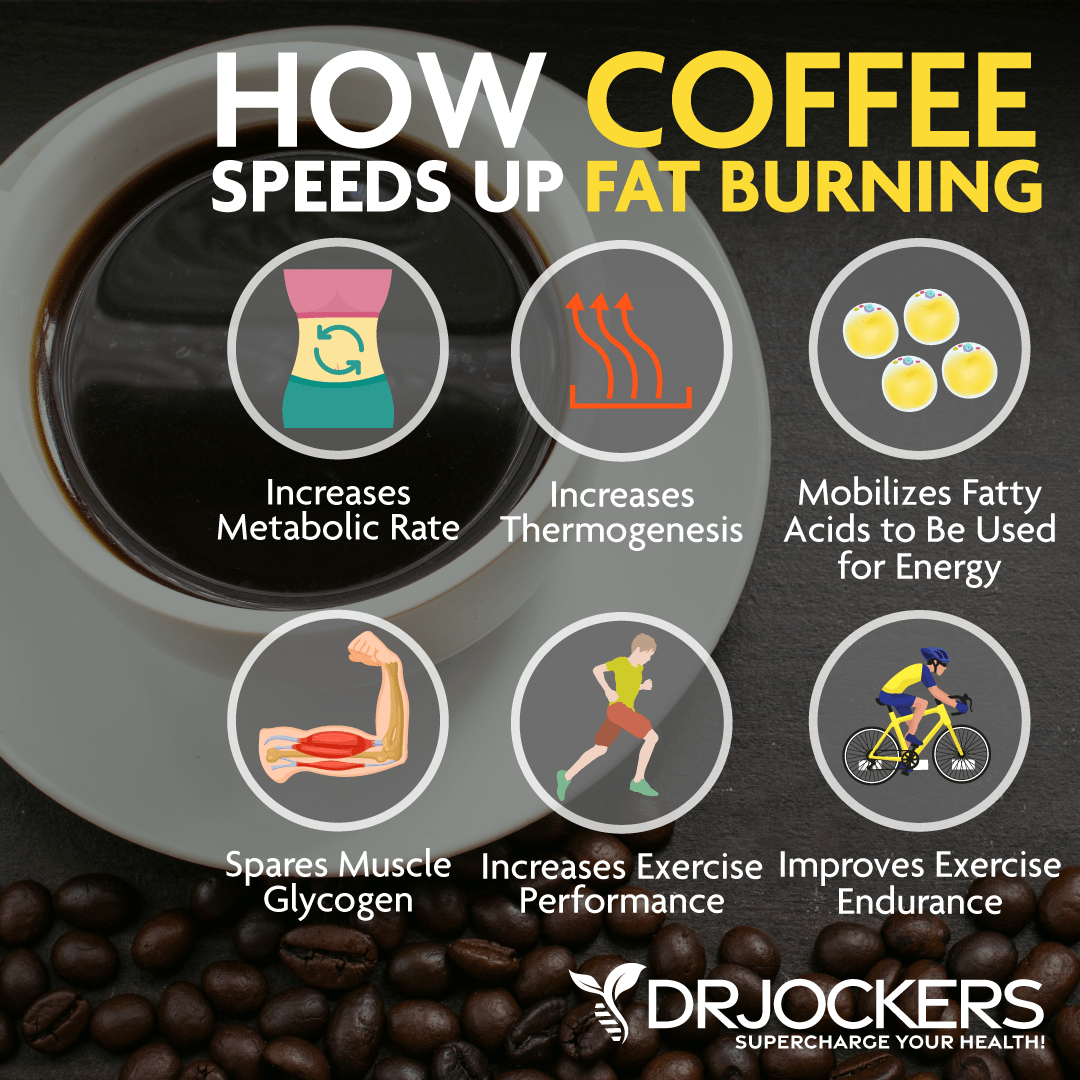
Blood Sugar
Blood sugar imbalances are a serious problem. They increase your risk of pre-diabetes and diabetes. Diabetes is a chronic health issue that is characterized by increased blood sugar levels and your body’s inability to secrete insulin or use it properly, affecting millions of people around the globe. Coffee may be beneficial for those with blood sugar imbalances.
A 2008 study published in the American Journal of Clinical Nutrition found that drinking 4 cups of coffee a day can contribute to a 30 percent reduced risk of diabetes (10). A 2005 systematic review published in JAMA has found that habitual consumption of coffee may reduce the risk of type 2 diabetes (11). A 2009 systematic review and meta-analysis published in the Archives of Internal Medicine found that drinking coffee can reduce the risk of diabetes by 7 percent (12).
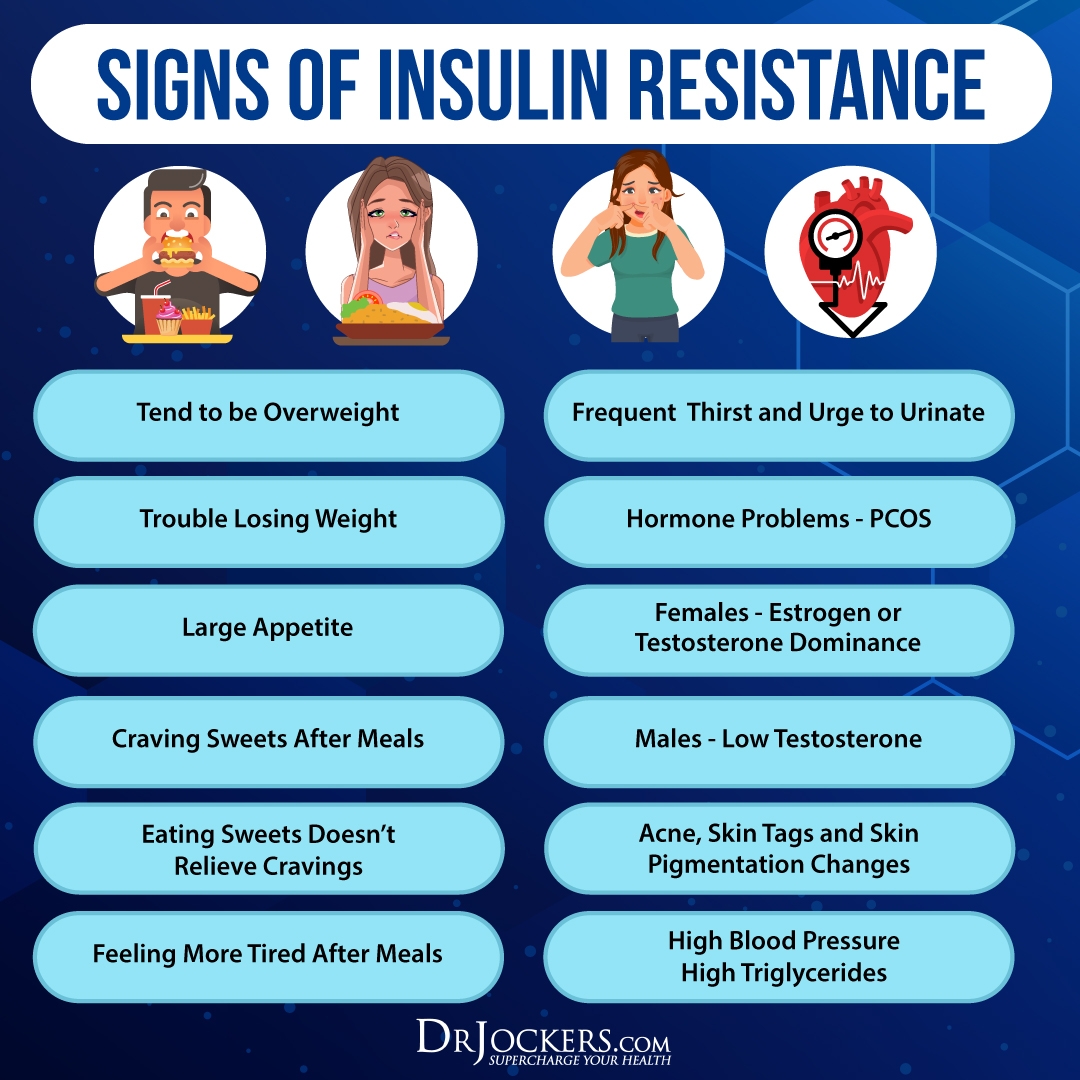
Activating Autophagy
Autophagy refers to cellular recycling, where the cell itself metabolizes various components in order to reuse them and build new and healthier cells. Your cells contain organelles, which are smaller components. When your cells are exposed to a stressor, such as nutrient deprivation, it triggers autophagy.
Your cells create phagophores, a double-membrane structure that surrounds cellular components and transports them to lysosomes. Lysosomes are unique organelles that degrade old and damaged cellular components with degrading enzymes, leaving room for the body to create new and healthy cells.
It turns out, drinking coffee may help to improve autophagy. According to 2014 in vivo research published in Cell Cycle has found that coffee may improve cellular autophagy (13). The study has found that the polyphenols in coffee can induce autophagy and also reduce the acetylation levels of proteins. By stimulating autophagy, coffee may help to lower the risk of metabolic and other diseases and reduce mortality.
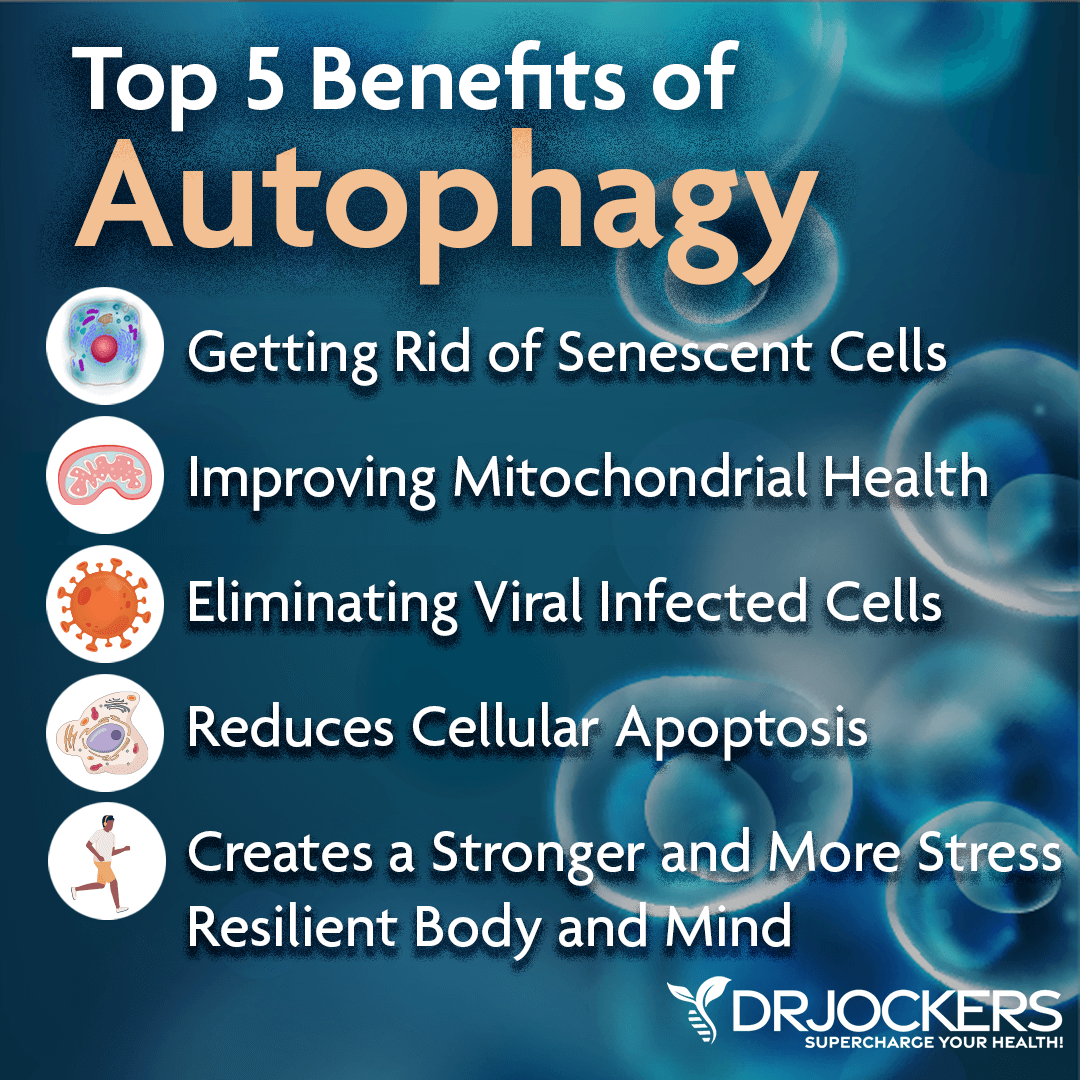
Bowel Movements
Coffee may also be good news if you are struggling with constipation. Coffee stimulates the muscles inside your colon and helps peristalsis, the involuntary tension and relaxation of muscles in your intestines that may help your bowel movement.
It can help motility, digestion, and excretion. According to a 1990 study published in Gut, coffee has increased gut motility in 58 male and 34 female healthy volunteers, and the effects lasted for up to 30 minutes (14).
While some of the benefits of coffee can be attributed to caffeine, it’s not the case when it comes to your bowel movements. It looks like the effects are similar to decaf coffee as well. The acidity of coffee triggers an increase in stomach acid and gastric acid levels that may stimulate your bowels and cause bowel movements.
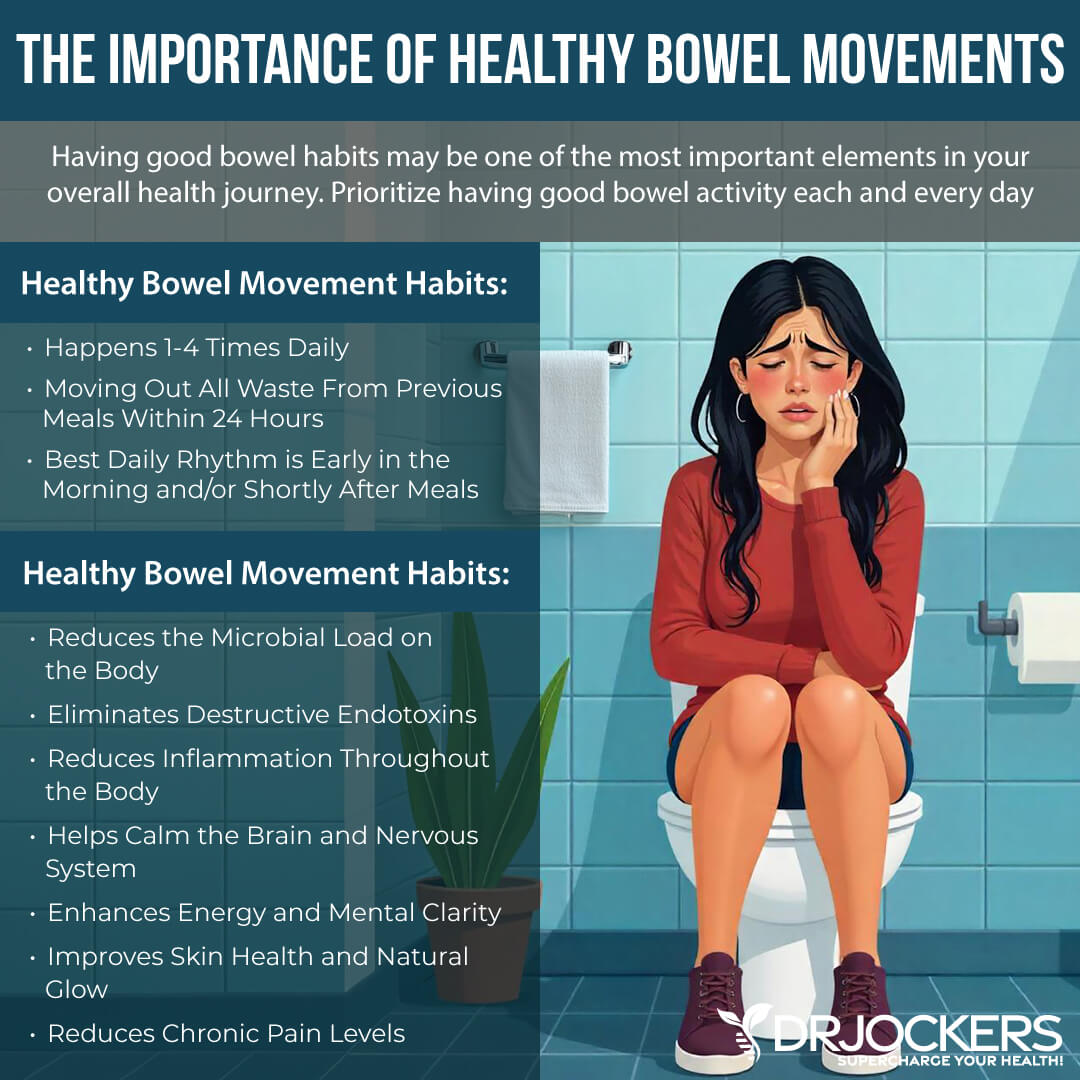
Polyphenols in Coffee
Coffee is rich in polyphenols, which are micronutrients with an array of health benefits, including autophagy, better blood sugar, and fat burning. According to a 2015 study published by Academic Press, polyphenols in coffee may decrease the risk of cardiovascular disease parameters, including high blood pressure and cholesterol (15). A 2014 in vivo research published in Cell Cycle has found that coffee may improve autophagy and cellular renewal (13).
A 2015 study published in Nutrition Research has found that coffee polyphenols have improved hyperglycemia associated with impaired vascular endothelial function in healthy male participants and, as a result, lowered the risk of oxidative stress as well (16). Polyphenols in coffee may also help to reduce blood sugar levels and reduce the risk of diabetes. A 2017 review of human trials published in Oxidative Medicine and Cellular Longevity has found that polyphenols can help to decrease blood sugar and reduce the risk of metabolic syndrome and diabetes (17).
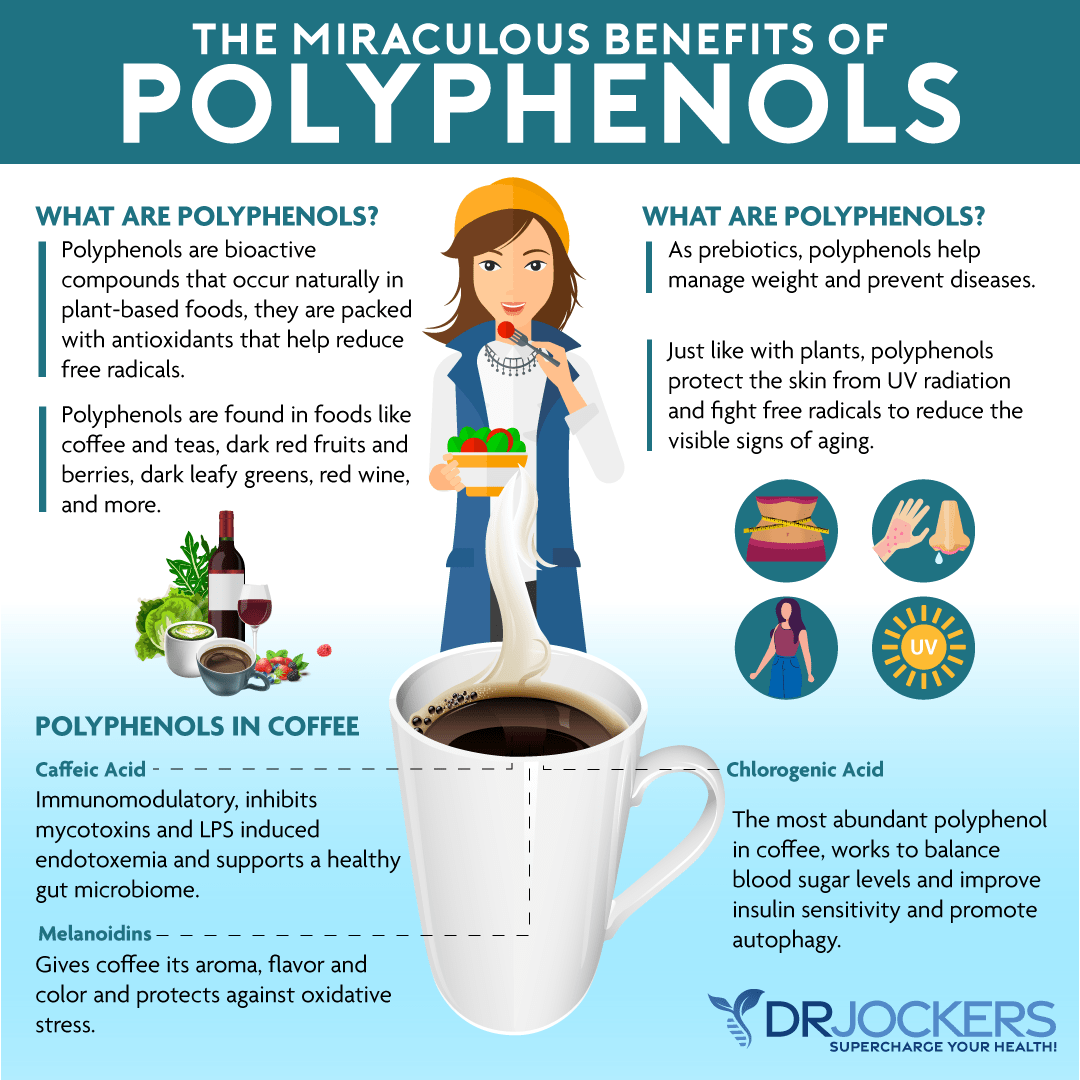
Chlorogenic Acid (CGA): The most abundant polyphenol found in coffee, which scavenges free radicals. CGA concentration in a single coffee serving ranges from 20-675 mg, depending on the type of bean, roasting temperature, and brewing method. Some CGA is lost during the roasting process.
Melanoidins: Brown colored substances that are formed during the roasting process and give coffee its aroma, flavor, and color. This antioxidant appears to increase in abundance during the roasting process and not only serves to remove damaging free radicals, but also helps to detoxify the body of metals.
Caffeine: Not only a central nervous system stimulant, but it has been shown to reduce the activity of free radicals and therefore acts as an antioxidant. The caffeine content in beans ranges from 0 mg/serving in decaffeinated coffee (decaffeinated beans do typically contain a minor concentration of caffeine) to 322 mg/serving in espresso coffee. Most people do best with 50-150mg or so in a sitting, and it is important to be careful not to overwhelm your system with caffeine.
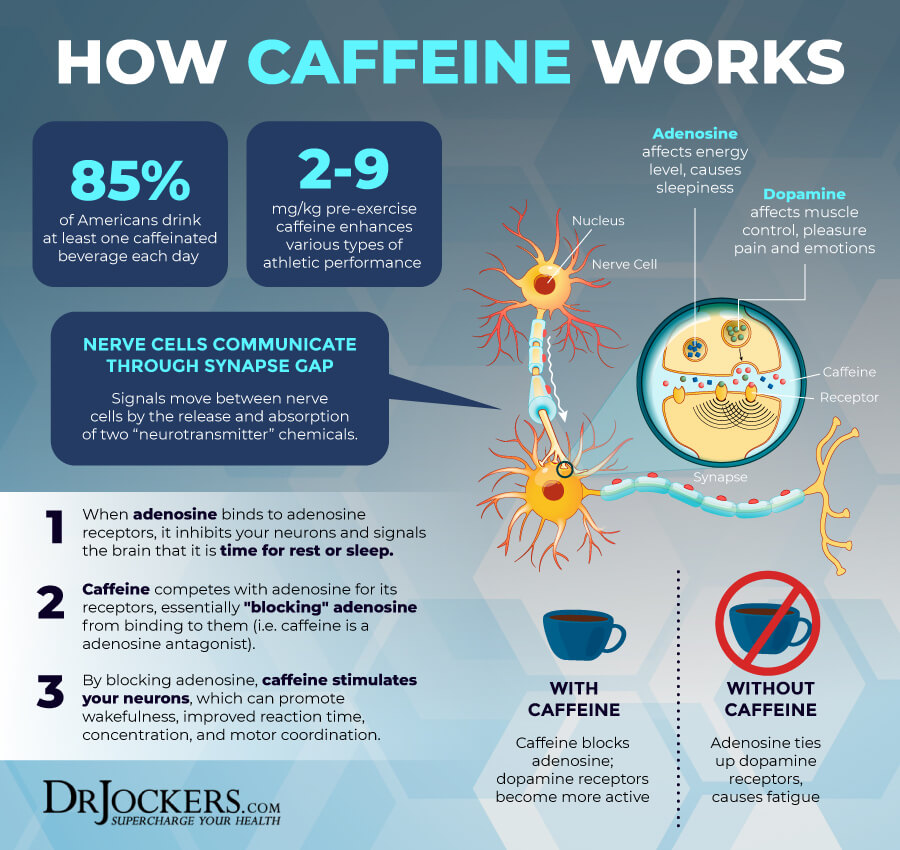
The Downside of Coffee
Unfortunately, drinking coffee or drinking too much coffee can have its downsides as well. Let’s look at some of the problems that may arise.
Pesticides
Coffee can, unfortunately, be toxic, which can lead to headaches, sickness, fatigue, and other chronic health issues. The majority of coffee, especially cheaper brands, sold in the United States is not organic. If you are getting non-organic coffee, it means you will be consuming these pesticides.
According to a 2012 study published in Shokuhin Eiseigaky Zasshi (Japanese), while much of the pesticide residue disappears during the roasting process, not all does; some pesticides are very resistant to heat (18). Pesticides can lead to a variety of adverse health effects, including digestive issues, headaches, fatigue, cognitive issues, chronic pain, and chronic health issues.

Mycotoxins
Mycotoxins are toxins coming from fungi and mold. According to a 2003 study published in Food Additives and Contaminants, up to 91 percent of green coffee beans are affected by mold, while (19). A 1995 study published in Food Chemicals and Toxicology found that about half of commercially brewed coffees are affected by mold (20).
Drinking low-quality, moldy coffee can become a serious problem and lead to an array of chronic symptoms and health issues. If you don’t feel good drinking traditional coffee, it may be due to a reaction you are having to mycotoxins. Look for a mycotoxin free version that is 3rd party tested for purity. I will go over my favorite USDA certified organic, mycotoxin free brand that I use at the bottom of this article.
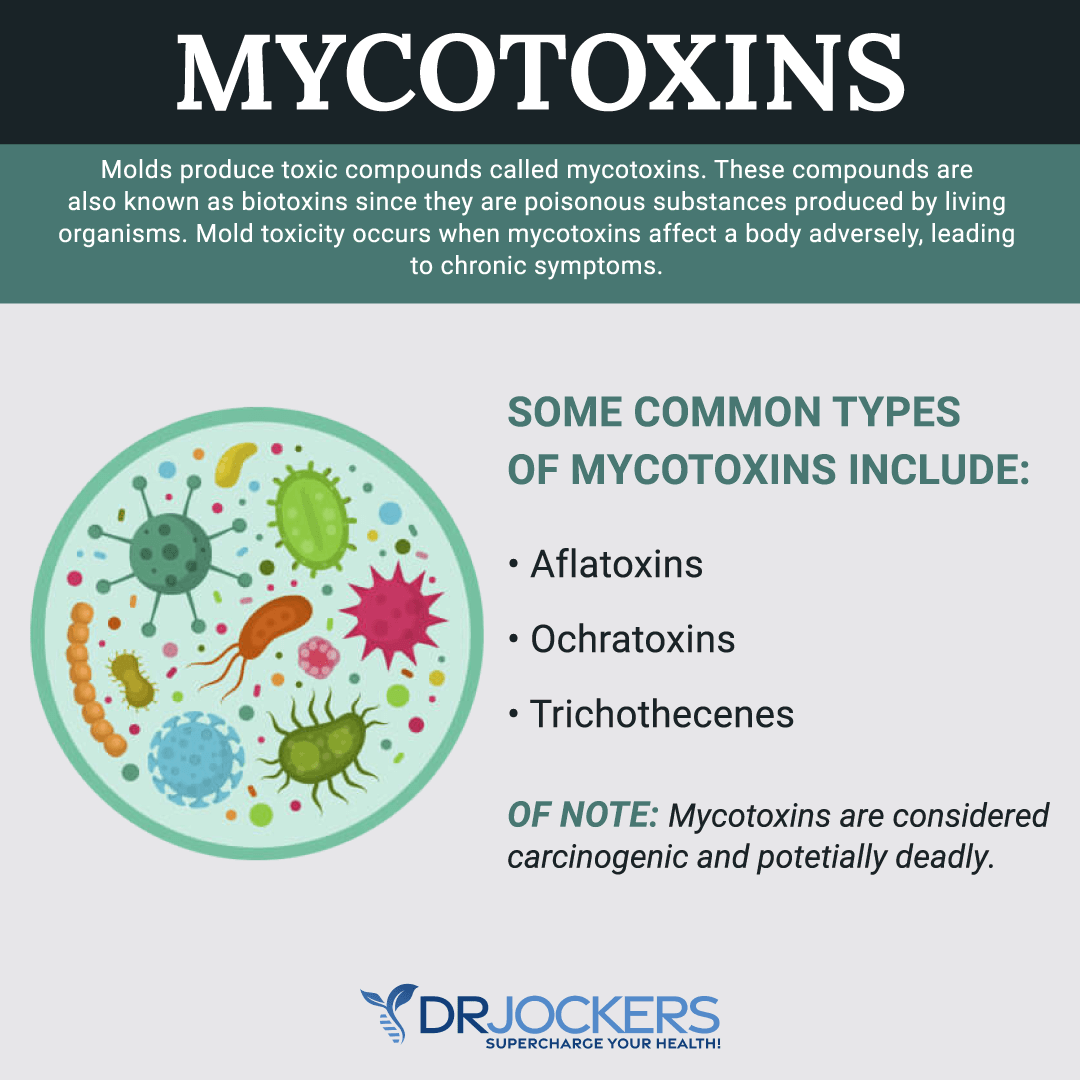
Diuretic
Coffee may also be a mild diuretic. It can make you pee and also increase the risk of dehydration. According to a 2017 study published in Frontiers in Nutrition, coffee high in caffeine can have short-term dehydrating effects (21).
However, as a 1997 study published in the Annals of Nutritional Metabolism has shown, to experience fluid imbalance or dehydration, you have to drink a lot of coffee, up to 6 cups. This, however, may also depend on the person, and it’s important that you understand your body (22).
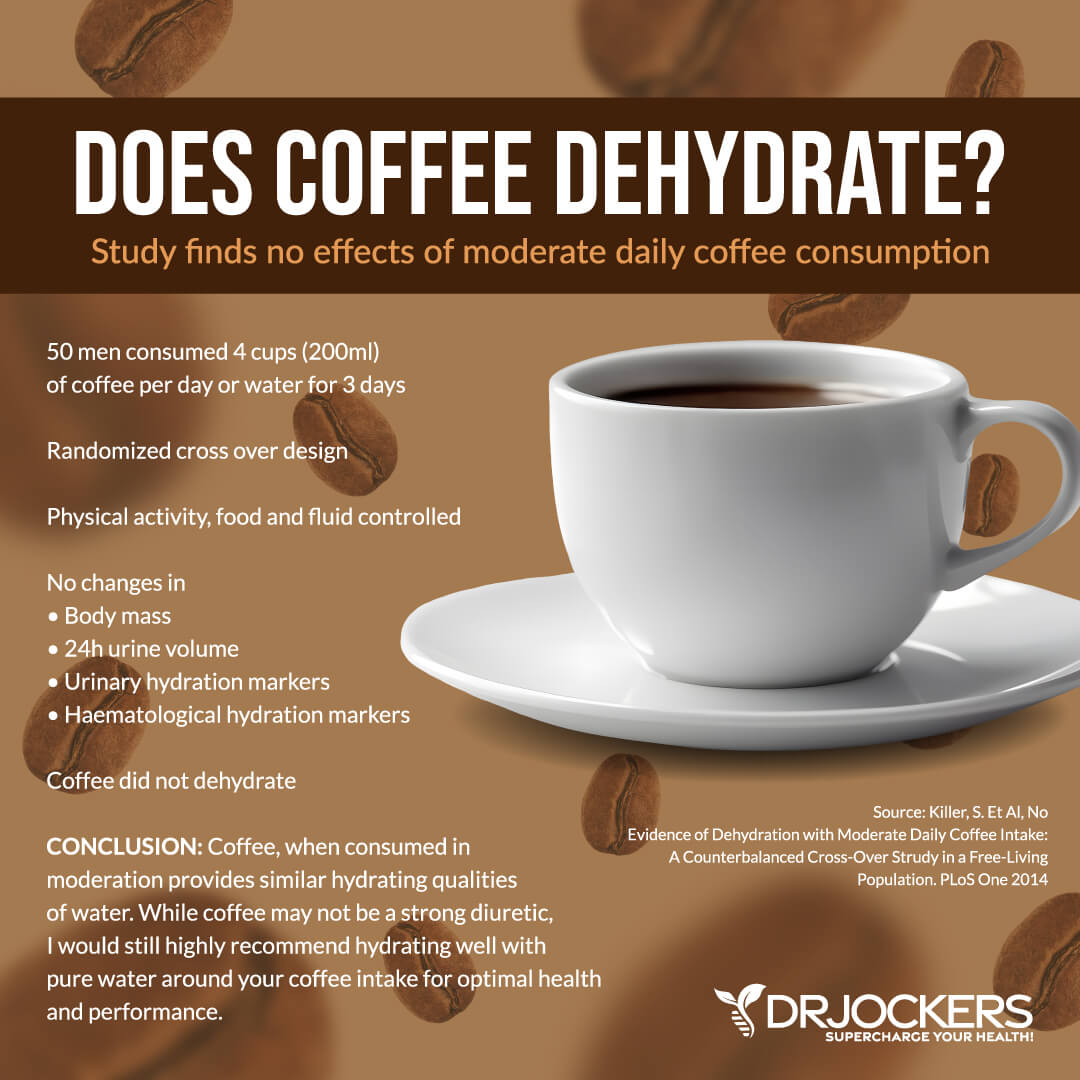
Problems With Too Much Caffeine
According to a 2017 review published in Frontiers in Psychiatry, drinking low to moderate amounts of caffeine is safe for most individuals (23). However, too much caffeine can become an issue. Too much coffee can affect your mood, stress levels, sleep, concentration, and other areas of your health.
Remember, it is all individual. For some people, even a little bit of caffeine can be too much. According to a 2005 study published in Advances in Psychiatric Treatment, caffeine can increase anxiety and sleep issues (24). People with eating disorders may also misuse it, leading to complications. Coffee can also lead to addiction.
According to a 2012 study published in Drug and Alcohol Dependency, not drinking coffee can lead to withdrawal symptoms, including headaches, fatigue, mood issues, concentration difficulties, and flu-like symptoms in heavy coffee drinkers (25).
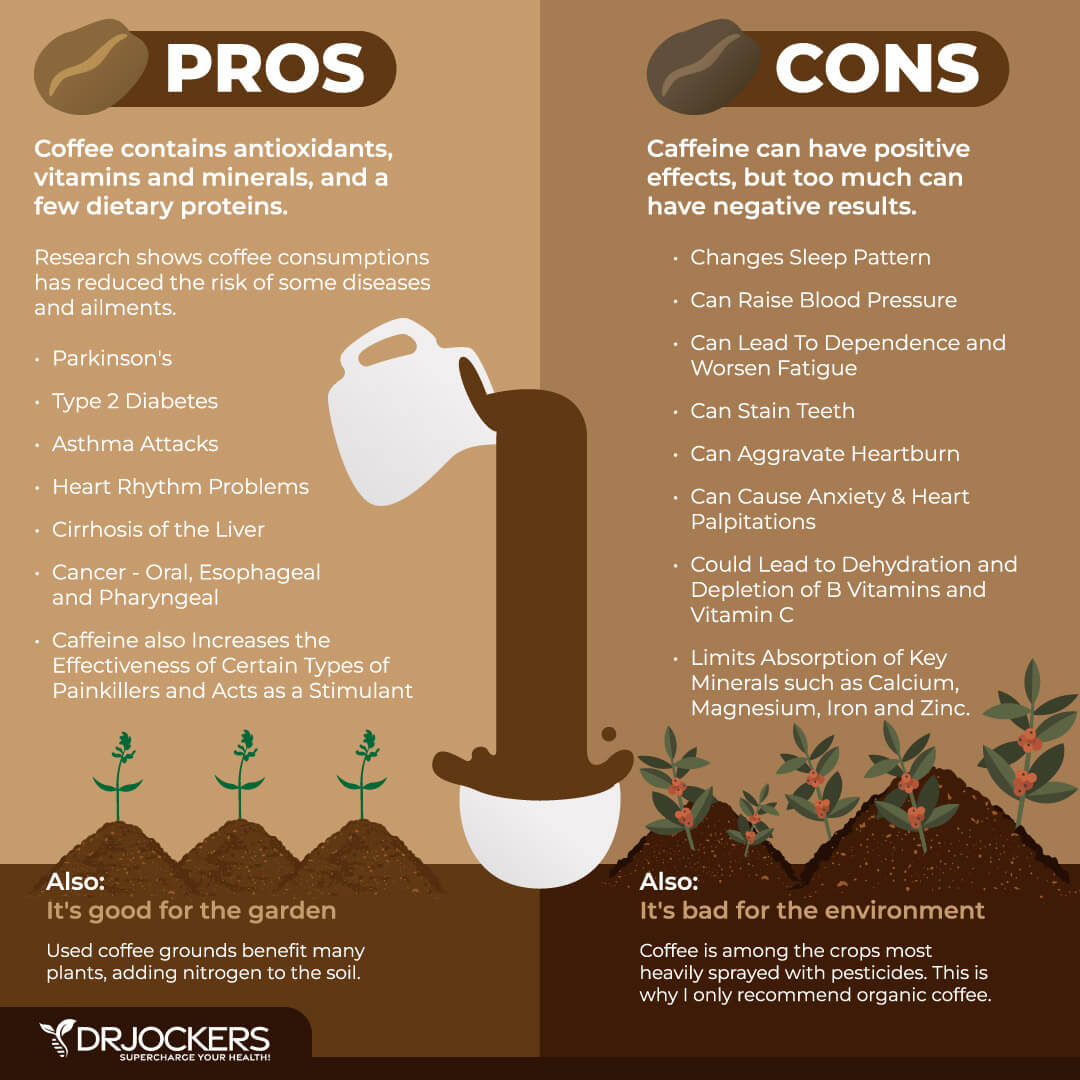
Digestive Disturbances
While coffee can support digestion by assisting bowel movements, it can also lead to digestive disturbances. While in most people, coffee only helps with elimination, in some, drinking too much coffee can increase diarrhea or other digestive symptoms.
According to a 2009 population-based study published in Gastroenterology Research, coffee can contribute to gastroesophageal reflux disease (GERD) (26). Some types of coffee are very acidic and can cause stomach irritation. To avoid these effects, look for shade-grown which is low-acid coffee.
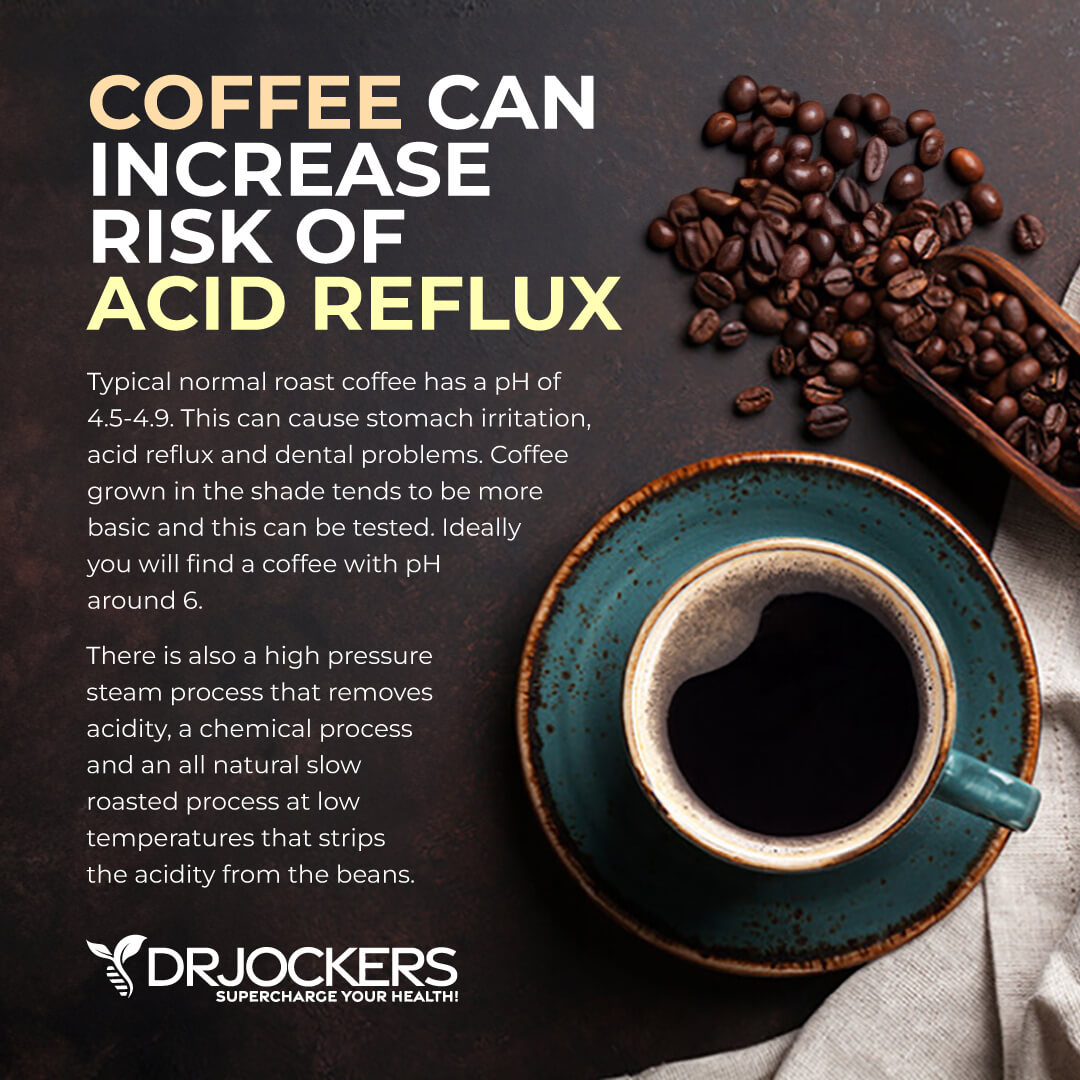
5 Tips to Get the Most Out of Your Coffee
If you love coffee and want to enjoy its benefits safely, I have several recommendations for you. When you apply these strategies, you will avoid the challenges that may come with caffeine, and you will enhance the fat burning, energy, and mental clarity you get from drinking your coffee.
The people I have worked with who have followed these strategies have raved about how good they feel when they do these things. Here are my 5 tips to get the most out of your coffee.
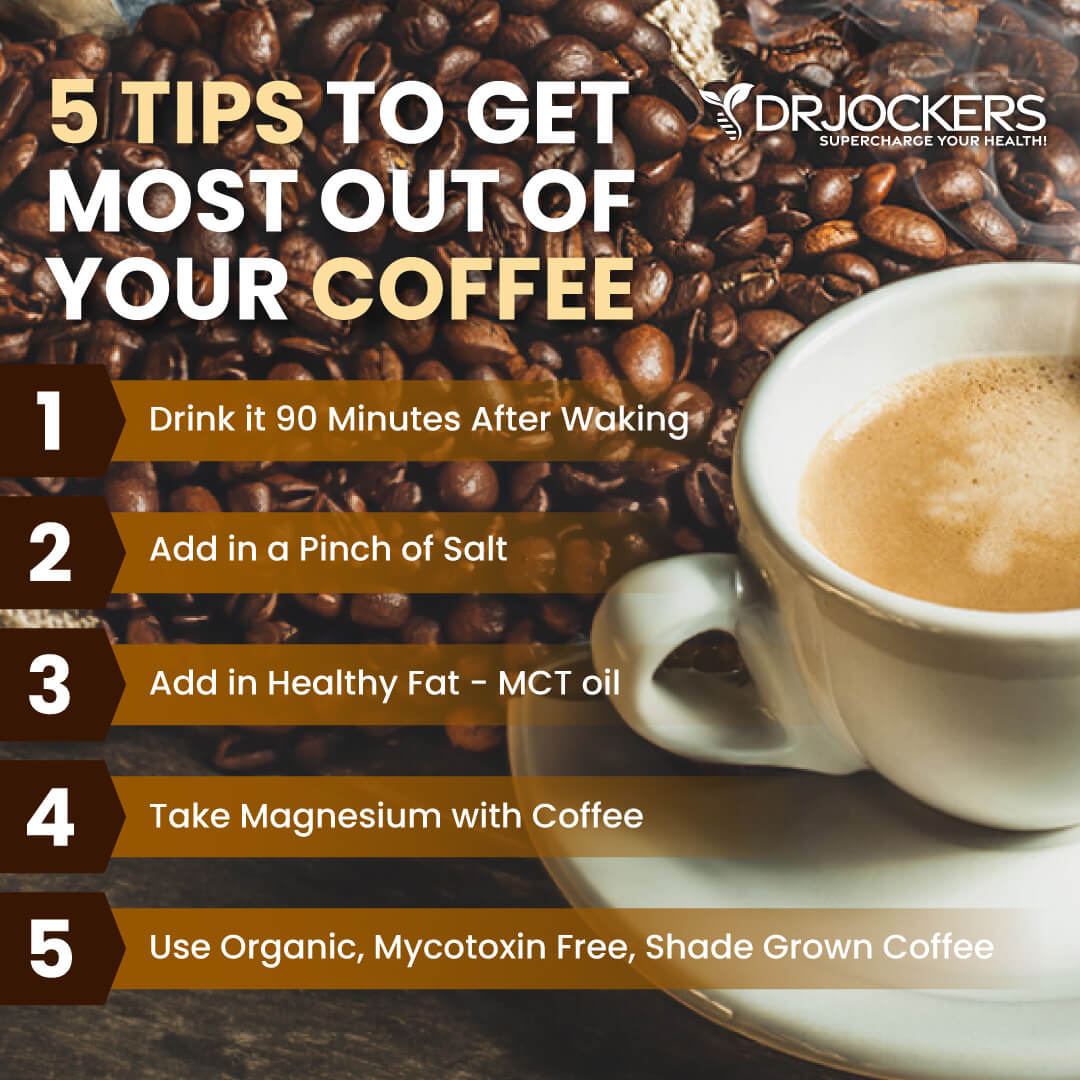
Drink it 90 Minutes After Waking
While for most people drinking coffee is a morning tradition after waking, it may be better to wait. Understanding the cortisol awakening cycle, as explained in Stress: Concepts, Cognition, Emotion, and Behavior (2016), is important (27). Your body naturally increases cortisol when you wake up.
Adding coffee to that mix when your body is naturally high on cortisol may not be as effective. Instead of experiencing an energy boost from caffeine, you may feel fewer benefits and may just build up a tolerance. Instead, I recommend that you wait for about 90 minutes after waking up with your first cup when your cortisol levels are lower.
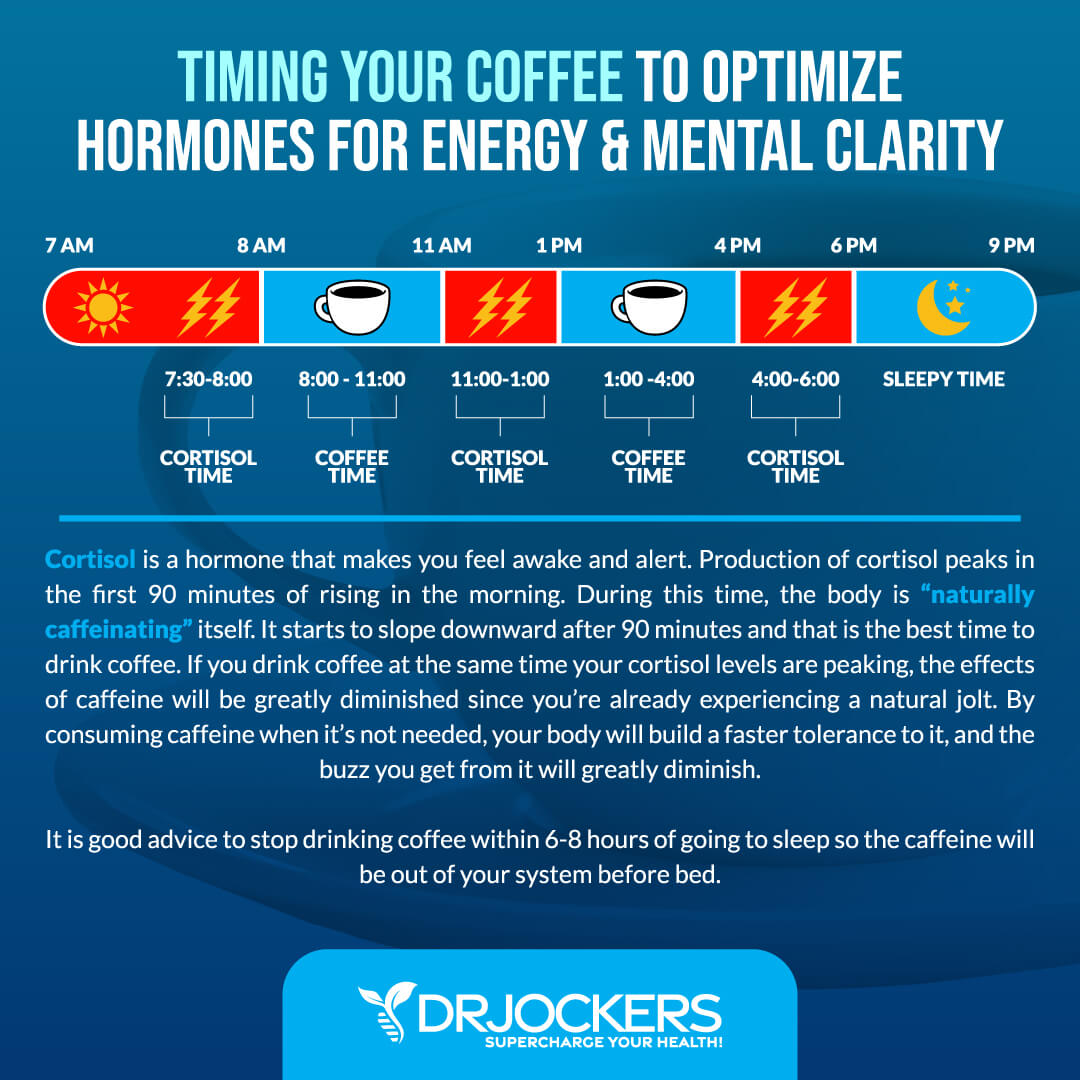
Add a Pinch of Salt
Coffee is a diuretic (21, 22). This means that it can dehydrate your body and reduce electrolytes. To avoid electrolyte loss, I recommend that you add a pinch of salt to your coffee.
This may seem strange, but don’t worry, you won’t find your coffee salty, and you will be happy to experience its health benefits. If, for some reason, you don’t like the pinch of salt in your warm beverage, you can take it on the side and just put the pinch of salt on your tongue. It is always good to use a high-quality sea salt such as Redmond’s Real Salt, Himalayan Sea salt, or Celtic Sea salt.
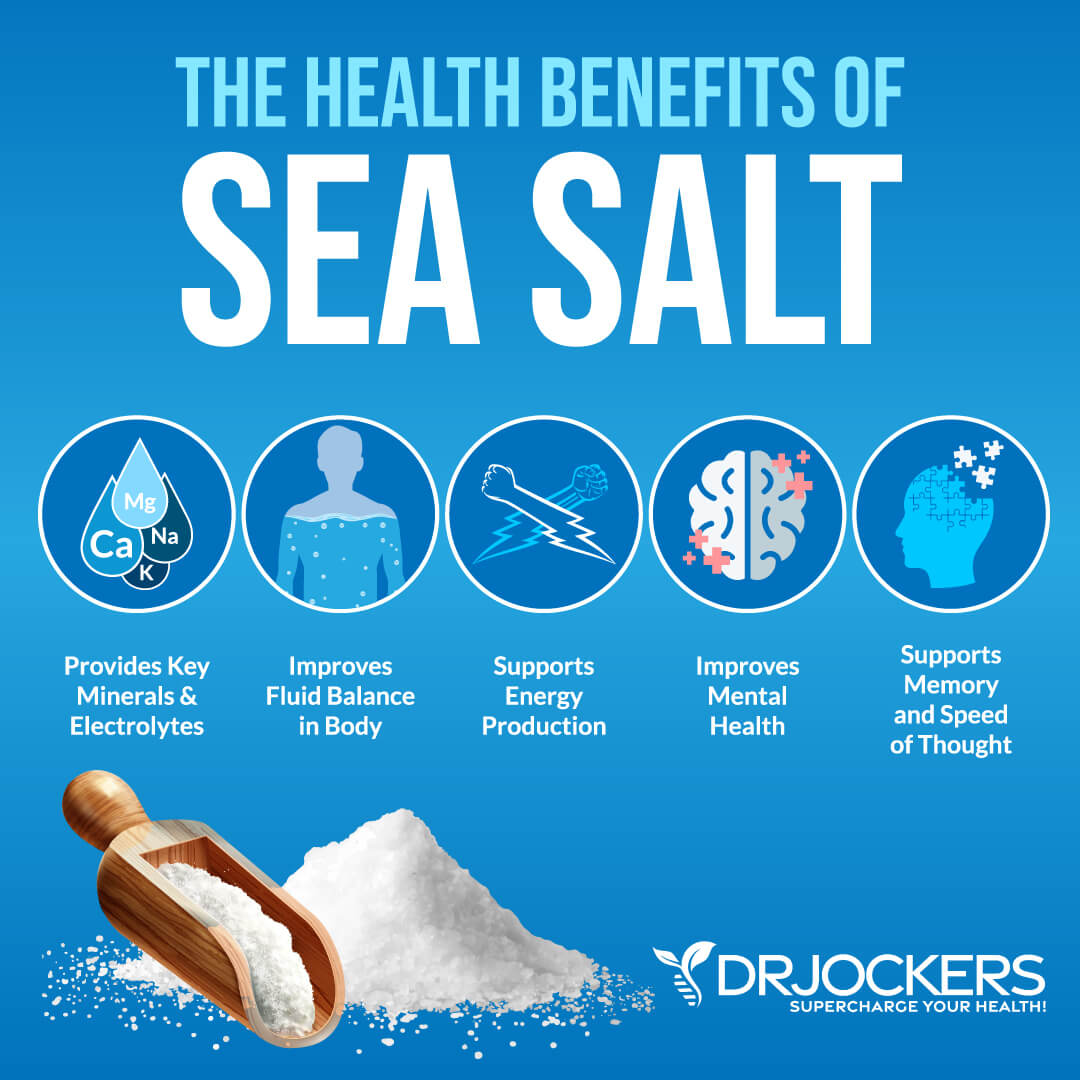
Add Healthy Fat
Coffee may already help with fat loss, blood sugar levels, digestion, and autophagy (8, 9, 10, 13, 15). Why not add some healthy fats, and in particular a C8 only MCT oil to the mix to improve these benefits and support a state of nutritional ketosis and fat loss.
According to a 2018 randomized controlled clinical trial published in the Journal of Nutrition & Metabolism, medium-chain triglycerides (MCTs) support ketosis (28). The C8 – Caprylic acid form of MCT is the one that is easiest to digest and drives up ketones the quickest in the brain.
These ketones give you better mental energy, reduce hunger and cravings and give you better mental endurance. I recommend that you add a tablespoon of C8 MCT Oil, like Keto Brain C8 MCT Oil, to your coffee to drive up ketones.
Consider Taking Magnesium with Your Coffee
Coffee is already great for boosting your brain power (5, 6). To enhance this benefit, I love to add some magnesium to the mix. According to a 2010 study published in Neuron, magnesium helps to boost your brain power by improving your cognition, memory, and learning (29).
I recommend that you add 1-2 scoops of Unsweetened Brain Calm Magnesium. I love this trick. Just a boost of magnesium helps to improve my focus and concentration even more, without the burn out many people experience with coffee.
Use an Organic, Mycotoxin Free, Shade Grown Coffee
Low-quality conventional coffee is not great. Pesticides and mycotoxin in coffee can be harmful to your health (18, 19, 20). It is important that you drink high-quality, organic, mycotoxin-free, and shade-grown coffee for optimal benefits and safety.
I personally love and highly recommend Lifeboost Coffee. This coffee is organic, free from GMO, shade-grown, sun-dried, pesticide and chemical-free, full of antioxidants, stomach-friendly, less acidic than most coffee, and fairly traded with a 2-year shelf life. Most importantly, it is absolutely delicious.
Right now, they have a special sale for my community where you can try this delicious, low-acid, immune boosting coffee for up to 58% off for a limited time. You can also get a one-time 15% discount on any single purchase of Lifeboost Coffee using the coupon code JOCKERS15 at checkout.
Final Thoughts
Coffee is loved around the world. It has many fantastic health benefits, but it may have some drawbacks as well. It is important that you choose high-quality, organic coffee for full benefits and drink it in moderation to eliminate the drawbacks.
Try my 5 strategies to get more benefits from your caffeinated beverages. Make sure to check out my recommendation and try my favorite brand, Lifeboost Coffee, to support your health and optimize your morning.
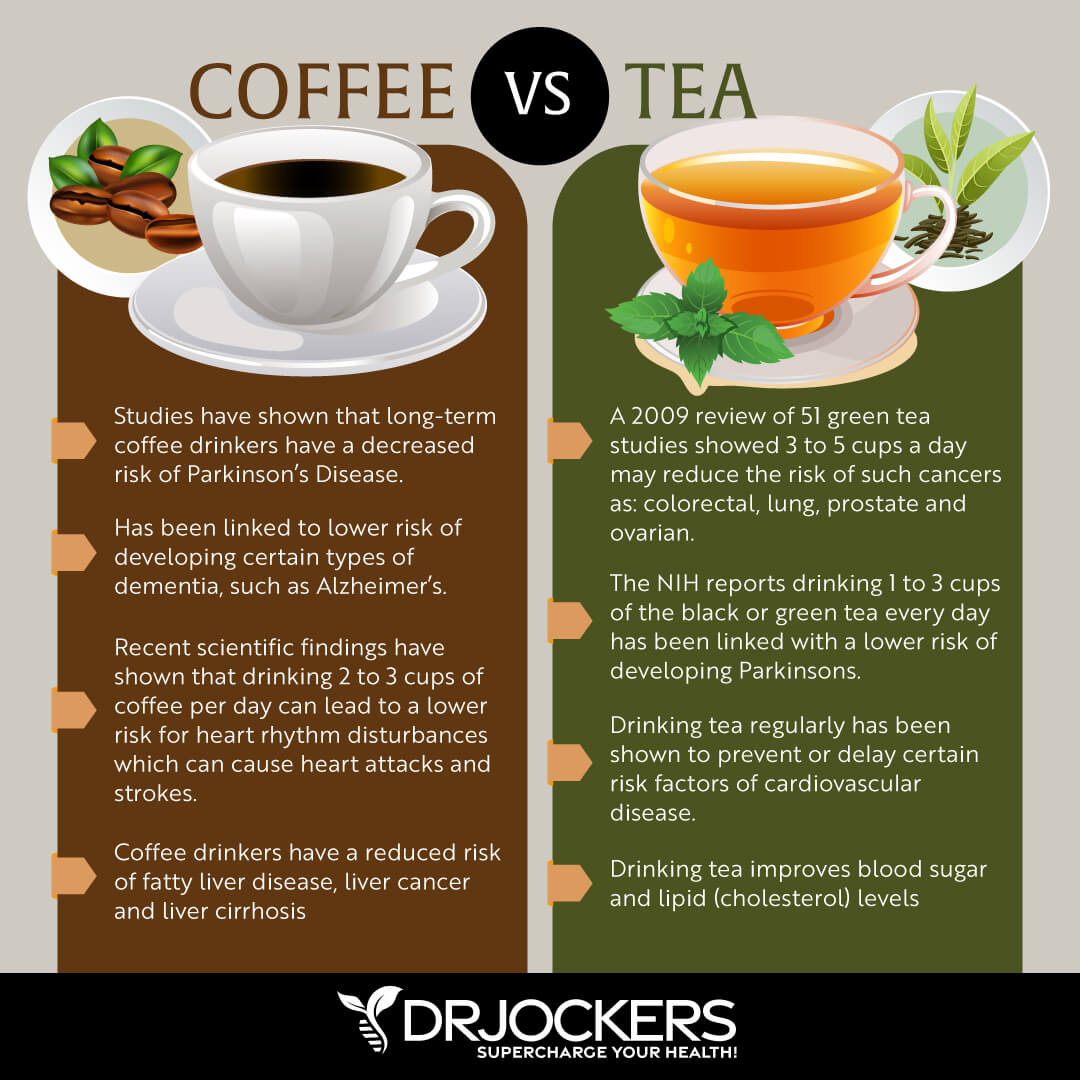
If you want to work with a functional health coach, I recommend this article with tips on how to find a great coach. Our website offers long-distance functional health coaching programs with our world-class team of health coaches. For further support with your health and other goals, just reach out—our fantastic coaches are here to support your journey.

Inflammation Crushing Ebundle
The Inflammation Crushing Ebundle is designed to help you improve your brain, liver, immune system and discover the healing strategies, foods and recipes to burn fat, reduce inflammation and Thrive in Life!
As a doctor of natural medicine, I have spent the past 20 years studying the best healing strategies and worked with hundreds of coaching clients, helping them overcome chronic health conditions and optimize their overall health.
In our Inflammation Crushing Ebundle, I have put together my very best strategies to reduce inflammation and optimize your healing potential. Take a look at what you will get inside these valuable guides below!

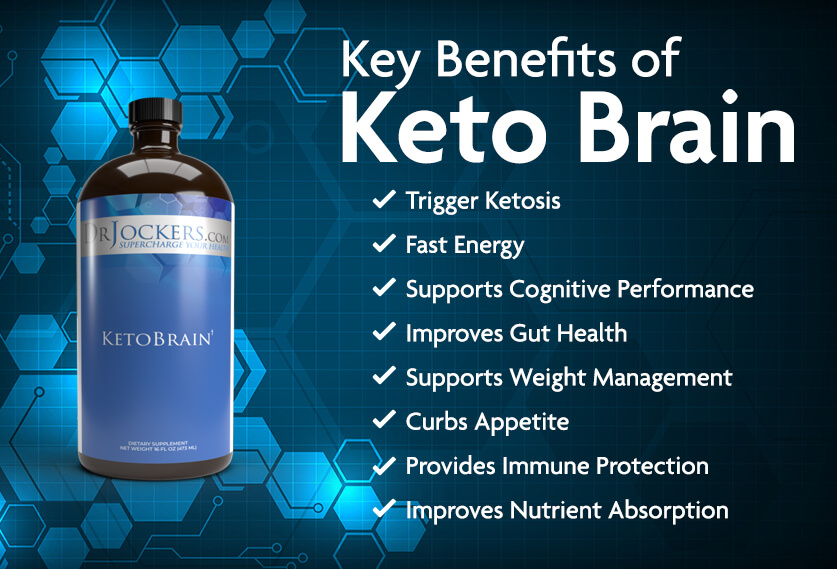

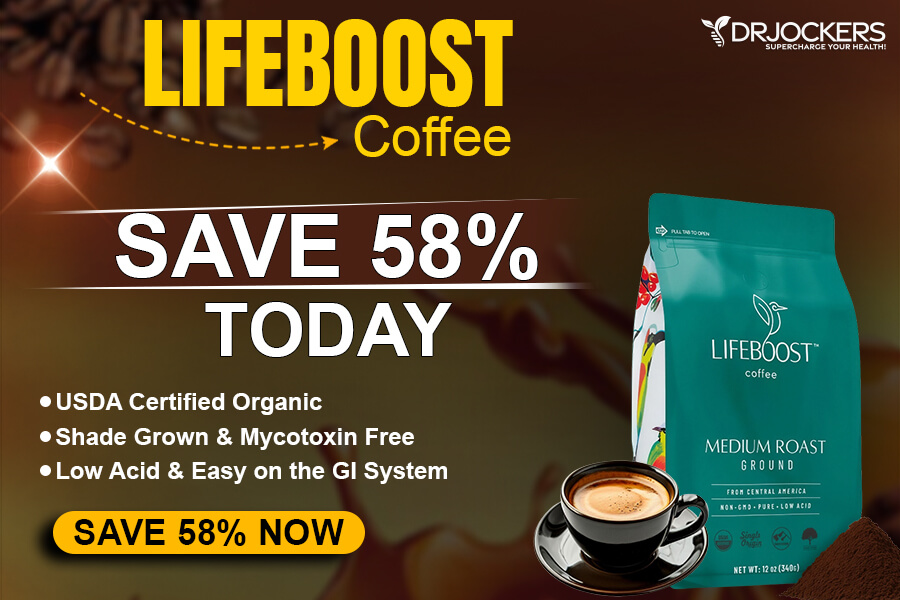




Personally, I drink and enjoy high quality organic coffee….mostly only cold-brewed….however, I think drinking excessive amounts of caffeine triggers the release of adrenaline, and adrenaline is the source of the fight-or-flight response……the fight-or-flight mechanism sidesteps rational thinking in favor of a faster response to ensure survival…..this is great when a tiger is chasing you, but not so great when you’re responding to a snarky e-mail…..when caffeine puts your brain and body into this hyper-aroused state of stress, your emotions overrun your behavior…..caffeine’s long half-life ensures you stay this way as it takes its sweet time working its way out of your body……the article accurately mentions some other possible cons to coffee consumption…
I agree about coffee increasing adrenaline or the fight or flight effect. Anybody who has a cortisol issue or is on a strict antifungal or candida diet is always told to avoid coffee and caffeine in general. The higher cortisol immediately releases glucose and glycogen into the bloodstream and promotes fungal growth levels. So I am confused when this article says it’s “good for blood sugar.” That’s just not what I’ve researched for years about coffee. However, I still drink about 1/4 cup of coffee, and I now order from LifeBoost also. For coffee enemas I use an extremely powerful green roast suggested by the Gerson Clinic and combine it with LifeBoost 1/2 and 1/2. These organic and mycotoxin/pesticide free coffees are extremely expensive however, but I feel it’s worth it. I also notice the greatly reduced stomach acidity from LifeBoost as well. I hope Dr. Jockers can comment on my question about blood sugar levels spiking from caffeine in coffee. Even the Gerson clinic that treats all autoimmune disorders does not allow coffee or any caffeine orally. They only allow it for coffee enemas because it has a completely different effect when used in the colon.
Another great article from Dr. Jockers, however I agree with you that the element of caffeine adversely affecting the central nervous system and initiating a fight or flight response in many is an overlooked seriously detrimental aspect of this drug.
It also drains energy from your body. Many caffeine users exhibit raised shoulders and forward neck positions related to energy drain that’s not compensated for. The energy “boost” caffeine gives us has to come from somewhere, our body.
The book, Caffeine Blues: Wake Up to the Hidden Dangers of America’s #1 Drug is a good scientific resource for what happens metabolically from caffeine. I do believe caffeine like many things affect different people differently depending on many factors including genetics.
Thanks for sharing!
Hi Dr. Jockers! Thank you for this very informative article! Do you know if there is any difference in health benefits between cold brewing vs. traditional brewing? I find iced coffee much more palatable, plus I live in Florida and don’t like consuming hot beverages when it’s 95 and humid 🙂 . Also, do you have any recommendations regarding coffee consumption during pregnancy? Thanks for your help!
Hey Kim
Thanks for writing. There is nothing wrong at all with cold brewing and if the coffee wasn’t roasted it will actually have more anti-oxidants. The less heat processing = the more anti-oxidants.
I would not drink more than 8oz of coffee a day if you are pregnant as too much caffeine can effect sex hormone production and healthy development of the baby!
I enjoy perking my coffee with a couple tablespoons each of dehydrated kale (for the nitrates & nitrites), centella, spearmint leaf, and holy basil. Can also add some cacao nibs.
It’s my understanding that cold brew is also much less acidic than heat brewed coffee and acid alkaline balance is critical for good health.
Dr. Jockers, I recently weaned myself off of the PPI I was taking, after learning about how bad this medication is for you. I haven’t been able to drink coffee since then without getting heartburn. I am confused by this because the acidity of apple cider vinegar relieves my heartburn. So why would the acidity in coffee aggravate it? I really miss drinking my one cup of organic coffee in the morning.
Hey Patti,
This is a great question. Coffee hyperstimulates the body due to the caffeine whereas ACV helps to reduce H plyori levels and helps to stimulate gastric acid production to improve stomach acid, bile and pancreatic enzyme levels. I would stay off of coffee for 3 months, work on de-inflaming your body and then try adding it back and see how you respond.
Try adding a pinch or two of baking soda to the coffee! No more heartburn.
Thank you for the great article Dr. Jockers. Over the years your articles/video have taught me a lot. Found Lifeboost years ago. I add baking soda to a pot every morning. Glad to hear that drinking coffee has so many proven benefits. Most of what I experience is mentioned in your article. One that was not, is that a cup in the morning enables me to defer eating until the afternoon. A type of incremental fasting. I drink one large cup of black coffee, with the baking soda, nothing else added. Have done this for the three years now, without issue. Eating one large meal a day, at my age of nearly 70, seems to give me even more energy. Without the coffee I get hungry. Have never been on any medication. I eat as much as I want for three hours in the late afternoon into the evening, depending on my work load for the day. Working in the yard landscaping is something I don’t want to give up. So far, I have very few aches and pains. I take supplements, including some high quality vitamin C. and eliminated 90% of the sugar I used to eat. Would adding magnesium and salt to the coffee interfere with the fasting???
I didn’t realize that coffee contained some chemicals that actually help to stimulate your brain and improve productivity. It can be helpful to have a coffee service nearby for work to get your employees moving, especially in the morning. I’ve even heard of some companies that do coffee delivery, making it easier for you and your employees to get that extra nudge in the morning.
That’s a good idea Bernard! Coffee can definitely be an effective performance booster if used responsibly.
I have been working on healing a leaky gut for over a year now. I used to drink one cup of coffee every morning prior to the leaky gut. I really enjoyed it, because I had more energy. However, since the leaky gut situation, I didn’t know whether or not I could have it. I’ve heard so many say that it’s an irritant, but I see in your info. That it’s anti- inflammatory, so that is good. So I guess what I’m asking is…Can I have coffee or not when healing a leaky gut? No one has mentioned this and I haven’t asked my Alternative medicine Dr. Because I just know she’s gonna shoot me down!!! I’ve gone a year without it, but I’d like to have a little coffee again. Please let me know what you think, Dr. Jockers, you’ve never steered me wrong! Thank You
Hey Tracie! Test it out using the pulse test outlined here to make sure you do not have a sensitivity to it: https://www.youtube.com/watch?v=MAltrtVhORw
If the test indicates that you are not reacting to coffee, you could do something like our fat burning coffee here: https://drjockers.com/turmeric-fat-burning-coffee/
For added gut benefits, you could make it using the coffee bone broth protein we carry or add something like collagen protein and L-Glutamine. Monitor closely for how your digestive system responds if you give it a try!
I drink black coffee with salt and cinnamon sprinkled but no fat every morning a few hours before my first meal. I’m disturbed to see this advice not to drink coffee on an empty stomach – could there be an exception for those of us practicing intermittent fasting?
Hey Robyn, Coffee affects every individual differently and contains great health benefits! However, coffee can lead to dehydration, headaches, become addictive and contribute to adrenal fatigue. I don’t recommend more than 8oz of organic coffee daily. While intermittent fasting a bulletproof coffee can actually stimulate ketone production and can be used as a strategy for some to reduce hunger and follow a fast easier. Blessings!
Thank you!
That is similar to me – but without the salt and cinnamon, and the addition of a large desert spoonful of coconut oil powder and again of coconut cream, whisked in a frothy top layer. I often eat a square of 92% chocolate also. All that around 9am. I then eat my main meal around 13.00. Any advice most welcome.
Hey Dennis, That sounds like a delicious morning beverage! Here are some other recipes you may enjoy! Blessings to you!
You don’t recommend more than 8 oz of coffee a day? (Per reply to Robyn on 8/11)
Doesn’t that negate this article about consuming 3 – 5 cups a day for possible health benefits?
Hey Sandy, Yes I don’t recommend 3-5 cups. That was a study that indicated it, but I don’t think you need that much to get the benefits and too much coffee can overstimulate the adrenals.
So if coffee helps deter cancer then why can’t you drink it if you have cervical hpv. Since that can turn cancerous at times. I too have leaky gut, ibs with consistent diarrhea so would a super low caffeine & acid free brand be bad. I’m so confused with this & that info that keeps coming out.
Hey Linda, I’m sorry to hear that you suffer with these health problems. I am not aware of any well supported relationship between coffee intake contributing to risk factors associated with HPV. Some people don’t respond well to coffee because they cannot metabolize caffeine and others have a sensitivity to the coffee bean. Every person’s body is different and has unique needs. This is why I also recommend working with a functional health practitioner who can get to the root cause of the problems and customize a healing protocol.
I have rosacea and was told no to have caffeine or hot spicy food. Will decaf be a benefit however small?
Hello Judy, you may do well with the Lifeboost coffee as it is pesticide, mycotoxin free and low-acid. Caffeine itself in moderation dosn’t flare rosacea…it is toxins and reactions to mycotoxins that would tend to be a factor.
Hey, Judy…I also have rosacea and was told the same thing…I drink my 8oz coffee each morning and eat spicy food in moderation…no problem.
Good information; very complete! I love Lifeboost Coffee and it is the only one I will drink (2 cups in the morning with my collagen and either grass-fed butter or coconut oil – yum!). All others do not taste good after drinking only Lifeboost for a couple years!
Great to hear that April!
Does coffee, on its own, break a fast? I do intermittent fasting and have heard mixed opinions on whether coffee itself can break the fast.
That is a great question. It depends on how you respond to it. Most people should respond well to black coffee and it should actually let you fast longer. If you notice that it gives you more cravings and makes it harder to fast then yes, it is breaking the fast.
Thank you. I’ve noticed that when I drink coffee, I go hours beyond my usual 13-16 hour fast without even trying because I have no hunger.
How about adding a 1/2 tsp of cacao powder to my coffee 3-4x/wk? I have read that there are some good Health benefits of cacao, and recently bought some high quality organic cacao powder from Earthtone foods from Swanson vitamins. Now hesitant to use since the package has warning label on cadmium levels. I am concerned about heavy metals and know most dark chocolate has some, but looking for a healthy choice. I know some companies do batch testing on their cacoa sources.
What are your thoughts on this product or suggestions.
Hello Eva, yes we recommend consuming organic dark chocolate. Most food has some metals and chemicals in it but if you get organic you are reducing the overall load. Adding in lots of good hydration, intermittent fasting, regular exercise and if you are able to use an infrared sauna and good binders like our Bioactive Carbon Metchem will help further reduce your toxic load. https://store.drjockers.com/products/bioactive-carbon-metchem
Love your articles. They are clear and easy to understand. I started doing research because my rheumatologist thinks I might have a case of fibromyalgia. I started with reading about magnesium and then GABA which led to coffee. Your email was loaded with great informative articles. Thanks so much! Plan to try Lifeboost coffee. Would like to know what brand of tea you recommend ? Thanks again 😊
Hi Nancy, I just wanted to comment about my own diagnosed fibromyalgia. I had it for 30 years and ended up on full disability at age 50. I spent years researching my way out it. I reversed it all entirely by discovering that fibromyalgia and most all autoimmune disorders are caused by fungal overgrowth which leads to leaky gut. I went on an extremely strict low carb diet, almost like a ketogenic diet and in 6 months I was off disability and quit 13 medications. I now live a normal life, take no medications, no more over-the-counter stuff, and no more doctor visits, but I also maintain that diet because I feel so great. It feels like I’ve been born again in my new body!! Several relatives with severe arthritis are now reversing even their severe arthritis, discovering that their severe knee problems were actually just quiet fungal infections coming from their guts. The only clinician that discusses all this is Doug Kaufmann’s site at KnowTheCause. He does an excellent job explaining how it all works. Wishing you well!
Thank you! The Lifeboost is wonderful! Blessings!
My husband needs to take vitamins on an empty stomach when he wakes up. Is it best to drink coffee before or after taking his vitamins and how long should he wait in between?
Hello Karen – it is definitely better to take the vitamins before having coffee. He should wait at least an hour and ideally 90-120 mins after waking to drink coffee.
Nice article.
What is notably absent is the mention of cytochrome P450.
What about the possible association of coffee drinking and particularly caffeine with cytochrome P450 and potentially with various cancers? It is bad enough that some of my (usually clued-up) colleagues are avoiding coffee for fear of breast cancer.
Can you clarify that please?
Yes, we review that in this article: https://drjockers.com/slow-caffeine-metabolizer/
I understand the concept of waiting 90 minutes after awakening – makes sense. But for those with low cortisol upon awakening, would coffee be helpful right away or would that somehow train the body into no longer trying to produce the morning cortisol?
BTW, Lifeboost is my coffee of choice. After years of avoiding coffee due to hypersensitivity to caffeine, it turns out the mycotoxins were the much bigger culprit. Since starting use of this mold/mycotoxin-free, organic coffee about a year ago, no more jitters!
Yes it would be better to do something like get out and get early morning sun exposure, take a cold shower or take a walk to train your morning cortisol levels. For caffeine, always best 90-120 mins after waking.
I was enjoying coffee (one cup with fat and collagen pwdr.) till I read that it is an endocrine disruptor. I now use a de-caf, but would like the benefits of a real coffee. My Mom took a synthetic estrogen in the 50’s which she shared with millions of others. Now their offspring can have cancers, birth problems, etc. So, I make an effort to avoid all toxic endocrine disruptors. What do you think Dr. Jockers?
Fabulous information, I am going to share it with my husband who drinks 4-6 cups of black coffee per day.
With so many benefits, who wouldn’t drink coffee? Especially since it’s so easy to try different flavors with the k-cups and nespresso pods.
I do have one small contribution- I offer free short stories to savor during your coffee break! They are short and sweet but pack a punch! It’s called A Cup of Fiction, in case you wanted to go check it out 🙂
Thanks for sharing that!
I love a mix of espresso and dark roast, but I also perk my coffee with 1-2 tbsp each of dehydrated kale, centella, spearmint leaf, holy basil, and ginko leaf. These herbs are usually much less expensive to buy in bulk bags rather than as supplement capsules, and making a tea or perking them with coffee certainly beats eating a spoonful of leaves. The flavor is ubique and I like it. Importantly, many of the most important components of the leaves are water soluble, and you do not need to consume the leached leaf. For example, I grow a lot of kale – much more than I could use in soups or salads, or even give away – so I dehydrate the kale leaves and pack them in heat-sealed mylar bags with an oxygen absorber. Perking the kale with my coffee dissolves the nitrates and nitrites in the kale, to support nitric oxide production in my body, and reduce blood pressure, etc.
Sounds great! Thanks for sharing that!
Dr Jockers can you recommend a clean coffee maker?
what about a top bialetti espresso maker?
Hi Dr Jockers, thanks for this article.
What about the alternative ‘organic guarana’ ?
Thanks
Hi dr. Jockers. I am one of those fight or flight, high cortisol people that had to break up with their morning coffee but I switched to Organic Swiss Water Pressed decaf from Vermont. I get it mailed in bulk and it’s delicious and no more jitters plus I add l-theanine, your MCT oil, and magnesium. I do a mini expresso maker (bioletti) which winds up being quite strong for the flavor. Just recently Ive started using paper filters to filter out the cholesterol oils that Ive read come out through this process. I do have high cholesterol. Question one, have you heard of the cholesterol correlation and 2. Am I still getting benefits, polyphenols etc from organic decaf? THANK YOU!!